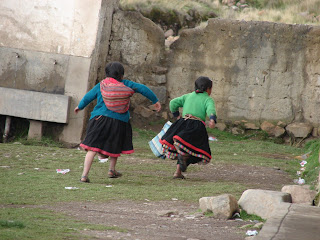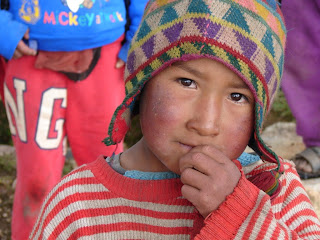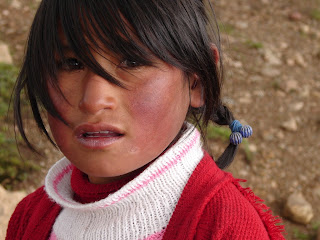Snowstorm
The boys are concerned about safety. They refuse to let me stop and get out my camera to take pictures. But you can imagine Alex striding down the mountain through the silence of a heavy snowfall, all determined and focused. I'm trotting behind him, trying to keep up in my blue winter hat and big green parka, and I'm sticking out my tongue to catch the downy flakes. John and Jackson are close behind me, stressed to stick together and lose altitude.
My winter is complete. I have tasted the snow of the Andes on my tongue.
We made a navigational mistake and missed our campsite earlier this afternoon. We were supposed to stop an hour ago, but instead of hiking all the way back down the valley to our safe nest next to a lake, we press on, determined to cross the high pass and not waste all our climbing.
We weren't planning on the snow. It covers the ground now, and we're praying that it won't get cold enough to stick to the path. For now, all we can see is the muddy little llama trail winding off before us, down down down down. The mountains are hidden in the whiteness. The mystery is magical.
We finally get down into a meadow and see some horses and John checks our elevation on his GPS: still above 16,000 feet. It's going to be a long afternoon.
But I love the snow. I sing a little song about snow, and also about snow angels and snowballs and mittens, and Alex gives me a funny look.
We hike on and on. We are cold, red-nosed, tired.
Finally we spot a teeny tiny stone hut, one room under a straw roof, with smoke curling up from the corner. It's way down in a valley, but it looks warm.
The inhabitants hear their dogs barking and come out, and they invite us in. As we crawl through the badger-sized door, we feel we are entering another century.
My winter is complete. I have tasted the snow of the Andes on my tongue.
We made a navigational mistake and missed our campsite earlier this afternoon. We were supposed to stop an hour ago, but instead of hiking all the way back down the valley to our safe nest next to a lake, we press on, determined to cross the high pass and not waste all our climbing.
We weren't planning on the snow. It covers the ground now, and we're praying that it won't get cold enough to stick to the path. For now, all we can see is the muddy little llama trail winding off before us, down down down down. The mountains are hidden in the whiteness. The mystery is magical.
We finally get down into a meadow and see some horses and John checks our elevation on his GPS: still above 16,000 feet. It's going to be a long afternoon.
But I love the snow. I sing a little song about snow, and also about snow angels and snowballs and mittens, and Alex gives me a funny look.
We hike on and on. We are cold, red-nosed, tired.
Finally we spot a teeny tiny stone hut, one room under a straw roof, with smoke curling up from the corner. It's way down in a valley, but it looks warm.
The inhabitants hear their dogs barking and come out, and they invite us in. As we crawl through the badger-sized door, we feel we are entering another century.




